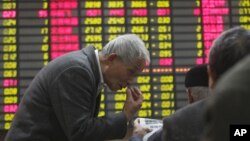A new report says the world's economy will make "a hesitant and uneven recovery" over the next two years.
A group representing 34 of the world's largest economies - the Paris-based Organization for Economic Cooperation and Development (OECD) - predicted Tuesday that the global economy would advance 3.4 percent in 2013. That would be up from 2.9 percent this year, but down from OECD's May projection for 4.2 percent growth next year.
The OECD's secretary-general, Angel Gurria, said the world's regional economic fortunes vary widely across the globe.
"The global economic outlook has deteriorated again," said Gurria. "A hesitant and uneven recovery is projected for the OECD area over the next two years, yet again. The euro area will remain in, or near, recession well into 2013. Growth is expected to pick up in the United States and Japan, but only gradually. And a quicker recovery is expected in the emerging market economies. This is, in a nutshell, how we see the world economy moving in the next couple of years."
Gurria said the lingering governmental debt crisis in Europe's 17-nation eurozone continues to be a significant threat to the world economy. He also said the dispute over government spending and tax policies in the United States could be a threat to the global economy if it is not resolved.
"The near-term outlook is not only weak, but also downside risks predominate," Gurria added. "Lingering euro area crisis remains a serious threat to the world economy. At same time, if left unresolved, the U.S. fiscal cliff could tip the U.S. economy into recession, and of course weigh on the global wealth and the global recovery, being the largest economy in the world."
U.S. President Barack Obama and key congressional leaders are currently attempting to resolve the long-standing stalemate over key financial issues before the end of the year.
A group representing 34 of the world's largest economies - the Paris-based Organization for Economic Cooperation and Development (OECD) - predicted Tuesday that the global economy would advance 3.4 percent in 2013. That would be up from 2.9 percent this year, but down from OECD's May projection for 4.2 percent growth next year.
The OECD's secretary-general, Angel Gurria, said the world's regional economic fortunes vary widely across the globe.
"The global economic outlook has deteriorated again," said Gurria. "A hesitant and uneven recovery is projected for the OECD area over the next two years, yet again. The euro area will remain in, or near, recession well into 2013. Growth is expected to pick up in the United States and Japan, but only gradually. And a quicker recovery is expected in the emerging market economies. This is, in a nutshell, how we see the world economy moving in the next couple of years."
Gurria said the lingering governmental debt crisis in Europe's 17-nation eurozone continues to be a significant threat to the world economy. He also said the dispute over government spending and tax policies in the United States could be a threat to the global economy if it is not resolved.
"The near-term outlook is not only weak, but also downside risks predominate," Gurria added. "Lingering euro area crisis remains a serious threat to the world economy. At same time, if left unresolved, the U.S. fiscal cliff could tip the U.S. economy into recession, and of course weigh on the global wealth and the global recovery, being the largest economy in the world."
U.S. President Barack Obama and key congressional leaders are currently attempting to resolve the long-standing stalemate over key financial issues before the end of the year.





